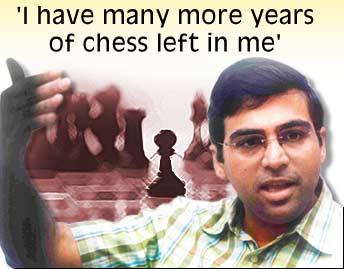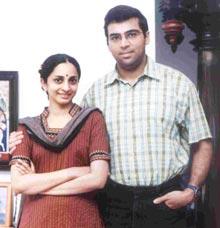
Shobha Warrier's interview with Grandmaster Vishwanathan Anand continues.
Part I: 'You really want to defeat Kasparov'
You won the titles for the fourth year in succession at both Corsica and Mainz Classic. Which was the sweetest, the hat-trick or the fourth one?
Ha! If I can make it fifth at both, I can become Lance Armstrong! [laughs] So that will be the sweetest!
Already you are being described as Lance Armstrong.
If I can do the fifth, it will be the sweetest, and if Lance doesn't plan to do his sixth! [laughs]. Okay, five in a row will be nice.
I like both the tournaments. I feel at home in both places. You can't describe it. You land in a place and feel you belong there, and you play well.
Let me ask you about the chess world ranking system. World number one Garry Kasparov has played only a couple of games this year, and he was joint third with you at Linares. You defeated Kramnik, the world No 2, at the World Rapid Chess Championship. Moreover, you have won the maximum number of titles this year. Still you are only world No 3. Don't you feel there is something wrong with the ranking system?
Yes. The ranking system only takes into account the seven-hour games. Nowadays, you have three seven-hour tournaments of five in total, and you have about 30 or 40 rapid chess tournaments. Which means only one-eighth of your tournaments will count in a calendar year, and it doesn't make any sense.
What I suggest is that we can create a second ranking system; a ranking system for the year. Then, you give a certain number of points to the super tournaments, like Linares, Mainz, Dortmund, etc, very similar to tennis.
The rating list we have now is not designed to be a rating list; it is some sort of a mathematical system. In this system, it is enough for me to do the bare minimum; that is, to play one game every two years or every year-and-a-half, and then I stay on the list. So in my best performances of 1973 and 1974, if I reached 2850 in 1985, and after that if I played one game a year, I could stay in the ranking list forever. It doesn't make any sense!
Now, Kasparov is frozen at the top, and he doesn't play. Kramnik is frozen almost at second. Kramnik and I are playing similar number of tournaments, but what happens is, we are frozen at 2 and 3 for the next six months.
I am not complaining that I can't go up. People below me also can complain that they cannot catch up with me. If I have a 60 point lead, it takes four years for them to catch up. So, it's not a very accurate system.
It is like [Pete] Sampras turning up and playing an exhibition game somewhere and remaining the number one in the list forever!
The rating system is a good mathematical system, which is valid because it gives us a good chess history. But it should not be used to name the best player of the year or who is number one at a certain moment.
Who will be able to change the system? Who can pressurize the authorities?
I don't think we need the authorities. The players association can do this privately. We have elected the office-bearers, and at some point I will make this suggestion.
Now, we have computerized all the games and they are floating around in the Internet. You just download them, list them by year, and you can name the best player of this year...and so on. You can say, from January to June, this man was leading, and this man caught up, etc. It is much more exciting.
These days everybody writes that your chess has become more aggressive. Do you agree?
 Actually, it is quite funny to read this. I always felt I was quite aggressive. Again, I read in a few places, where Anand used to agree for a draw, he now fights. Where I agree for a draw before, I agree for a draw even today.
Actually, it is quite funny to read this. I always felt I was quite aggressive. Again, I read in a few places, where Anand used to agree for a draw, he now fights. Where I agree for a draw before, I agree for a draw even today.
What has changed, I think, is I try not to prepare too much before a game. In Linares, I made the mistake of preparing too much before the game. Two o'clock, I was preparing for a four o'clock game. I don't want to do this again. I have noticed that if I go there unprepared, it works out better; you are more spontaneous. What is happening now is, I am not over-preparing during a tournament. That's why my game has gone up and not because I was taking unjustified risks.
Some also write that had you been this aggressive earlier, you would have had different results in your games against Kasparov. What do you say?
Possible. Against Kasparov, my mistake was I had prepared very rigidly, and that was not correct. I should have prepared in a slightly different fashion. We did quite a good job in the first World Championship that I played. Maybe, I should have paid more attention to the psychological aspect and so on. Nowadays, I am able to do that better.
The other day you said you were the oldest player at most tournaments. Some players were not even born when you started playing international chess. How do you feel to be the oldest in a tournament?
It's a very funny feeling! I am sure every chess player goes through it! I am sure players like Karpov might have felt the same. When they were just going for their Grandmaster title, I was born. Now it's my turn. When I became the World junior champion in 1987, (Teimour) Radjabov was, maybe, a month old! [Sergei] Karyakin (the world's youngest Grandmaster) was still not born for five years! He was born in 1991, I think. Some other guys like Ponomoriov were born in 1983, 1982...
I am the old guy, but I don't feel old at all. At 34, I still feel I have many more years of chess left in me. At the same time, it is quite remarkable to see people who are still teenagers. When I associate with them, I feel I am also a teenager! Sometimes I have to remember my age! [laughs]. It's just funny for me to see their viewpoint.
Is their viewpoint any different from what it was when you were a teenager?
I think it is a very similar to what I said when I was a teenager. Every top tournament they play is a first one or the second one for them, and they are still excited. Now I look forward to tournaments for different reasons.
What excites you these days when you go to play a tournament?
The social aspect! I like to go to these tournaments and meet all the chess colleagues. I love competition, tension and the feeling of wanting to play. It is boring to sit at home and analyze chess all the time.
In places like Wijk Aan Zee or other places, you have memories associated with the event. In Wijk Aan Zee, it is cold and I cherish the walk along the beach road. Then, you go to Monte Carlo and look forward to something else. Finally, I just have to go every few months and start playing again! Generally, I don't tend to get excited about tournaments because I want to win! I don't think along those lines at all. I prefer to go one round or two rounds at a time. Only after the 9th or the 10th round I start thinking, what are my chances?
Which tournaments have given you the most pleasant memories?
Different tournaments give me different pleasant memories.
Any unpleasant memories?
There are some disasters. If you are going back to those tournaments, you make an effort to find some other angle. For instance, at Dortmund, my worst performance was two years ago. When I was going back there, I was a little bit nervous, but I was very happy because we stayed in a different hotel in a different part of town, and I felt it was a new city. I felt much better. These small things do matter.
The funny thing is, after three rounds, the old memories came back and I thought, what the hell is this? I had not won a game in two tournaments! After round 5, when I won, I knew I had broken the jinx. Then, I won the sixth, the seventh and ended beautifully. Actually, I have pleasant memories of Dortmund too. I have played there many times, and played very well. But nowadays, when I mention Dortmund, everybody looks at me funnily. One year changed the way I look at it.
A few years ago you spoke about your early days as a chess professional. You said many people couldn't accept the fact that chess was a profession for you. How much has everything changed over the years?
There are 30 or 40 professional chess players in India now who make a living from chess. That gives you an idea. When I started out, there were only six or seven. It was tight. Now things are getting better and improving. Still, you have to work hard. There are many sports that are fighting for space or sponsorship in India. Obviously, cricket is well ahead. But you have a big group of other sports that attract sponsorship now. Definitely, there are more people now who can earn a living from chess.
How bright are the young players of India?
The national championship which finished just now gives a pretty good picture. [Koneru] Humpy could have finished higher. Sandipan [Chanda], [Pendyala] Harikrishna and [Surya Sekhar] Ganguly did well. [Ravi] Kunte was the only undefeated participant. He is very solid. That means we have a very good Olympiad team. I am seriously considering playing next time. If I play, there will be me, Sasi, Ganguly, Chanda, Harikrishna and Kunte. When our six-board is this solid, it will be quite interesting.
Do you interact with them on a regular basis?
Yes, I do. I am not the grandpa of the team; at least [I am] the uncle of the team! I think I am at least 10 years older than the next. It will be funny but I get along well with all of them.
Design: Imran Shaikh
Photographs: Sreeram Selvaraj






